后期维特根斯坦-语言游戏说-家族相似-私人语言later wittgenstein-language game-private language
论维特根斯坦语言哲学的两种学说_曹润宇

1889 年 4 月 26 日出生于维也纳的维特根斯坦出身豪门, 自幼跟随兄姊在 家 里 接 受 教 育,然 而 家 庭 教 育 却 无 法 使 其 达 到正规高中的接纳标准,直到 1903 年才进入一所技术中学学 习。少年的路德 维 希 爱 好 机 械 与 技 术,其 最 初 的 志 向 在 于 物 理学,十岁时就制出过一台简单实用的缝纫机。1908 年,他进 入英国曼彻 斯 特 维 多 利 亚 大 学 攻 读 航 空 工 程 空 气 动 力 学 学 位,期间,为了彻 底 搞 清 螺 旋 桨 的 原 理,同 时 出 于 对 数 学 的 兴 趣,维特根斯坦阅读了伯特兰·罗素与怀特海合写的《数学原 理》以及戈特洛布·弗雷格的《算术基础》。在 1911 年夏天拜 访 了 弗 雷 格 后 ,维 特 根 斯 坦 听 从 了 这 位 逻 辑 学 家 的 推 荐 ,前 往 英国剑桥大学三一学院问学于大哲学家罗素门下。罗素非常 欣 赏 这 位 学 生 的 才 能 ,把 他 视 为 最 理 想 的 接 班 人 ,预 言 哲 学 下 一步组成的,是 所 有 事 实 的 总 汇; 而 事 实 又 可 分 解 为 基 本 事 实,是基本事实的复合; 而基本事实则是由对象构成的,是对 象的一定方式 的 结 合。 语 言 则 是 世 界 的 对 应 物,与 世 界 相 对 应,语言是由命题组成的,是所有命题的总和; 而命题又可分 解为基本命题,是基本命题的真值函数; 而基本命题则是由简 单的语词组成的。这样,维特根斯坦就建立起了语 词———对 象,基本命题———基本事实,命题———事实,语言———世界的一 一 对 应 的 同 型 同 构 关 系 。由 此 ,维 特 根 斯 坦 认 为 ,事 态 能 够 为 语 言 所 摹 状 ,世 界 可 以 为 语 言 所 摹 画 ,因 为 语 言 与 世 界 共 有 实 在的逻辑形式,命 题 的 本 质 在 于 它 是 实 在 的 图 画。 正 是 在 逻 辑的空间,对象 成 之 为 对 象,事 实 成 之 为 事 实,世 界 成 之 为 世 界 。这 就 是 说 ,逻 辑 是 一 种 界 限 ,一 切 可 说 的 东 西 都 是 可 以 用 逻辑命题加以描述的,因而属于逻辑研究的范围; 而一切不可 说的则不属于逻 辑 研 究 的 范 围,因 为 他 们 根 本 不 存 在 与 逻 辑 空间之中。
维特根斯坦哲学视域下的语言学习观
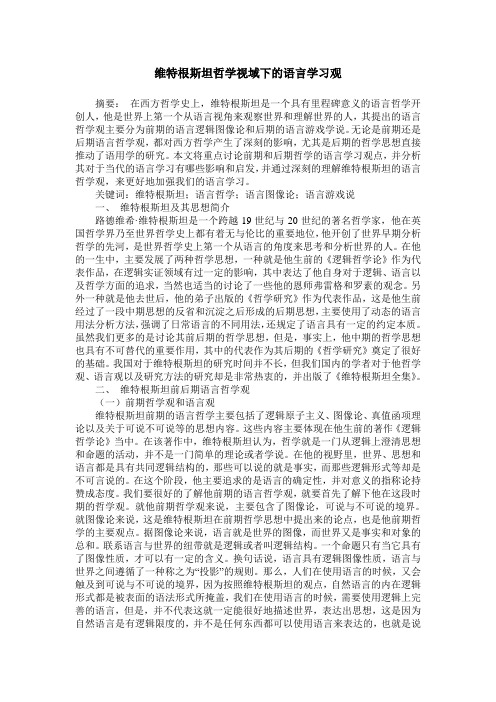
维特根斯坦哲学视域下的语言学习观摘要:在西方哲学史上,维特根斯坦是一个具有里程碑意义的语言哲学开创人,他是世界上第一个从语言视角来观察世界和理解世界的人,其提出的语言哲学观主要分为前期的语言逻辑图像论和后期的语言游戏学说。
无论是前期还是后期语言哲学观,都对西方哲学产生了深刻的影响,尤其是后期的哲学思想直接推动了语用学的研究。
本文将重点讨论前期和后期哲学的语言学习观点,并分析其对于当代的语言学习有哪些影响和启发,并通过深刻的理解维特根斯坦的语言哲学观,来更好地加强我们的语言学习。
关键词:维特根斯坦;语言哲学;语言图像论;语言游戏说一、维特根斯坦及其思想简介路德维希·维特根斯坦是一个跨越19世纪与20世纪的著名哲学家,他在英国哲学界乃至世界哲学史上都有着无与伦比的重要地位,他开创了世界早期分析哲学的先河,是世界哲学史上第一个从语言的角度来思考和分析世界的人。
在他的一生中,主要发展了两种哲学思想,一种就是他生前的《逻辑哲学论》作为代表作品,在逻辑实证领域有过一定的影响,其中表达了他自身对于逻辑、语言以及哲学方面的追求,当然也适当的讨论了一些他的恩师弗雷格和罗素的观念。
另外一种就是他去世后,他的弟子出版的《哲学研究》作为代表作品,这是他生前经过了一段中期思想的反省和沉淀之后形成的后期思想,主要使用了动态的语言用法分析方法,强调了日常语言的不同用法,还规定了语言具有一定的约定本质。
虽然我们更多的是讨论其前后期的哲学思想,但是,事实上,他中期的哲学思想也具有不可替代的重要作用,其中的代表作为其后期的《哲学研究》奠定了很好的基础。
我国对于维特根斯坦的研究时间并不长,但我们国内的学者对于他哲学观、语言观以及研究方法的研究却是非常热衷的,并出版了《维特根斯坦全集》。
二、维特根斯坦前后期语言哲学观(一)前期哲学观和语言观维特根斯坦前期的语言哲学主要包括了逻辑原子主义、图像论、真值函项理论以及关于可说不可说等的思想内容。
论后期维特根斯坦语言系统

作者简介 : 彭 志斌 ( 1 9 8 4一) , 男, 四川 营 山人 , 硕 士, 重 庆 工 商 大 学 派 斯 学 院助 教 , 主要 研 究方 向 : 语言哲学、 认 知语 言 学 、 外语 教 学 。
第2 7卷
第 5期
重庆第 二师 范学 院学 报
J o u na r l o f C h o n g q i n g Un i v e r s i t y o f E d u c a t i o n
2 0 1 4年 9月
V0 1 . 2 7 No. 5 S e p, 2 01 4
含义 , 语 言 和 由语 言编 织 在 一起 的活 动 一起 被称 为
在 1 9 6 9年 对颜 色词进 行 了研究 , R o s c h在 1 9 7 3年对 颜 色词 和其 他 一 些 范 畴 进 行 了实 证 研 究 , L a b o v在
“ 语 言游 戏 ” 。从更 广泛 的 角度 来 说 , 所 有 与语 言有
二、 后期维特根斯坦的主要语言论题
维 特根 斯坦 的 《 哲学研究》 是 其 后 期 思 想 的集 大成之 作 , 其 中提 出要 “ 回到 粗 糙 的地 面 来 ” , 要 关
注 日常语 言 , 全 盘否 定 自己前期 提 出 的逻 辑 实证 主
然 分开 的 。然而 , 这 种 哲 学诉 求 在 近 现 代受 到 了极
论 后 期 维 特 根 斯 坦 语 言 系斯 学 院 , 重庆 4 0 0 0 6 7 )
摘要: 作为 2 0世纪语言哲学界最具代表性 的人物 , 维特根 斯坦在 2 0世纪上半 叶引领逻辑 实证 主义流派 的 出 现, 2 0世纪下半 叶开创 了 日常语言流派。其后期理论 是对前期理论 的颠覆 , 提 出了语言游戏论 、 家族 相似 性 、 私 人 语言论 、 生活形式等著名理论 , 成 为语用 学、 认知语言学、 社会语言 学等语言 学分 支和流派 的理论 基石。维 氏以哲
科技哲学论文
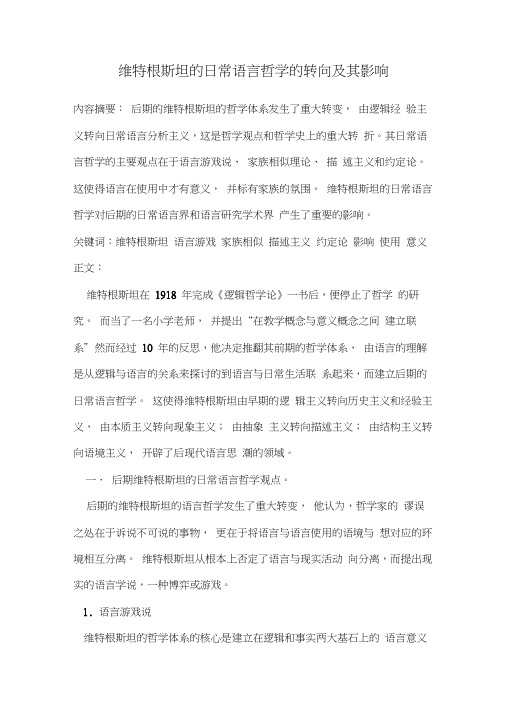
维特根斯坦的日常语言哲学的转向及其影响内容摘要:后期的维特根斯坦的哲学体系发生了重大转变,由逻辑经验主义转向日常语言分析主义,这是哲学观点和哲学史上的重大转折。
其日常语言哲学的主要观点在于语言游戏说、家族相似理论、描述主义和约定论。
这使得语言在使用中才有意义,并标有家族的氛围。
维特根斯坦的日常语言哲学对后期的日常语言界和语言研究学术界产生了重要的影响。
关键词:维特根斯坦语言游戏家族相似描述主义约定论影响使用意义正文:维特根斯坦在1918 年完成《逻辑哲学论》一书后,便停止了哲学的研究。
而当了一名小学老师,并提出“在教学概念与意义概念之间建立联系”然而经过10 年的反思,他决定推翻其前期的哲学体系,由语言的理解是从逻辑与语言的关系来探讨的到语言与日常生活联系起来,而建立后期的日常语言哲学。
这使得维特根斯坦由早期的逻辑主义转向历史主义和经验主义,由本质主义转向现象主义;由抽象主义转向描述主义;由结构主义转向语境主义,开辟了后现代语言思潮的领域。
一.后期维特根斯坦的日常语言哲学观点。
后期的维特根斯坦的语言哲学发生了重大转变,他认为,哲学家的谬误之处在于诉说不可说的事物,更在于将语言与语言使用的语境与想对应的环境相互分离。
维特根斯坦从根本上否定了语言与现实活动向分离,而提出现实的语言学说,一种博弈或游戏。
1. 语言游戏说维特根斯坦的哲学体系的核心是建立在逻辑和事实两大基石上的语言意义说,但其落脚点却在于对现实生活的反思中。
他认为语言与人们日常生活中形成的习惯、风俗密切相关。
他提出语言并非是“语言+游戏”,“游戏”一词只为了强调语言的动词性质(1),语言游戏强调的是一种活动的组成部分,或是生活方式的组成部分(2)。
它具有付出的社会性、实用性、有效性,是约定俗称的结果。
它丰富多彩,变化万千。
语言就是人类在日常生活中做的各种游戏。
它只服从于游戏规则,却没有绝对的客观性或指谓对象。
维特根斯坦提出词的意义不在于指谓什么,而在于实际生活中的应用。
浅谈后期维特根斯坦的语言哲学思想
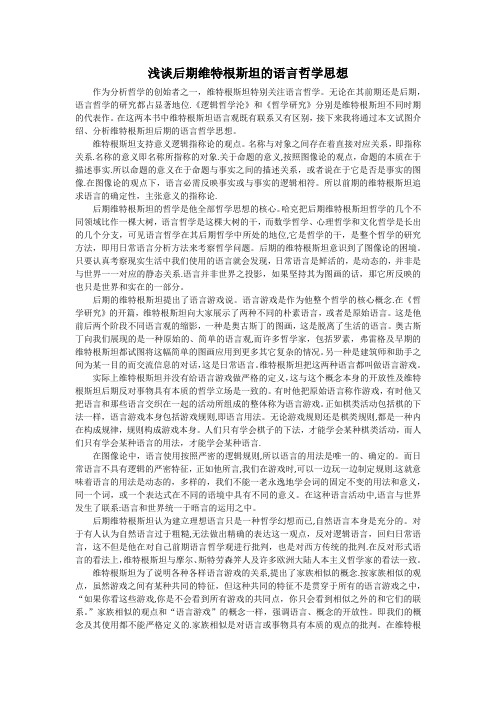
浅谈后期维特根斯坦的语言哲学思想作为分析哲学的创始者之一,维特根斯坦特别关注语言哲学。
无论在其前期还是后期,语言哲学的研究都占显著地位.《逻辑哲学沦》和《哲学研究》分别是维特根斯坦不同时期的代表作。
在这两本书中维特根斯坦语言观既有联系又有区别,接下来我将通过本文试图介绍、分析维特根斯坦后期的语言哲学思想。
维特根斯坦支持意义逻辑指称论的观点。
名称与对象之间存在着直接对应关系,即指称关系.名称的意义即名称所指称的对象.关于命题的意义,按照图像论的观点,命题的本质在于描述事实.所以命题的意义在于命题与事实之间的描述关系,或者说在于它是否是事实的图像.在图像论的观点下,语言必需反映事实或与事实的逻辑相符。
所以前期的维特根斯坦追求语言的确定性,主张意义的指称论.后期维特根斯坦的哲学是他全部哲学思想的核心。
哈克把后期维特根斯坦哲学的几个不同领域比作一棵大树,语言哲学是这棵大树的干,而数学哲学、心理哲学和文化哲学是长出的几个分支,可见语言哲学在其后期哲学中所处的地位,它是哲学的干,是整个哲学的研究方法,即用日常语言分析方法来考察哲学问题。
后期的维特根斯坦意识到了图像论的困境。
只要认真考察现实生活中我们使用的语言就会发现,日常语言是鲜活的,是动态的,并非是与世界一一对应的静态关系.语言并非世界之投影,如果坚持其为图画的话,那它所反映的也只是世界和实在的一部分。
后期的维特根斯坦提出了语言游戏说。
语言游戏是作为他整个哲学的核心概念.在《哲学研究》的开篇,维特根斯坦向大家展示了两种不同的朴素语言,或者是原始语言。
这是他前后两个阶段不同语言观的缩影,一种是奥古斯丁的图画,这是脱离了生活的语言。
奥古斯丁向我们展现的是一种原始的、简单的语言观,而许多哲学家,包括罗素,弗雷格及早期的维特根斯坦都试图将这幅简单的图画应用到更多其它复杂的情况。
另一种是建筑师和助手之间为某一目的而交流信息的对话,这是日常语言。
维特根斯坦把这两种语言都叫做语言游戏。
后期维特根斯坦语境论研究
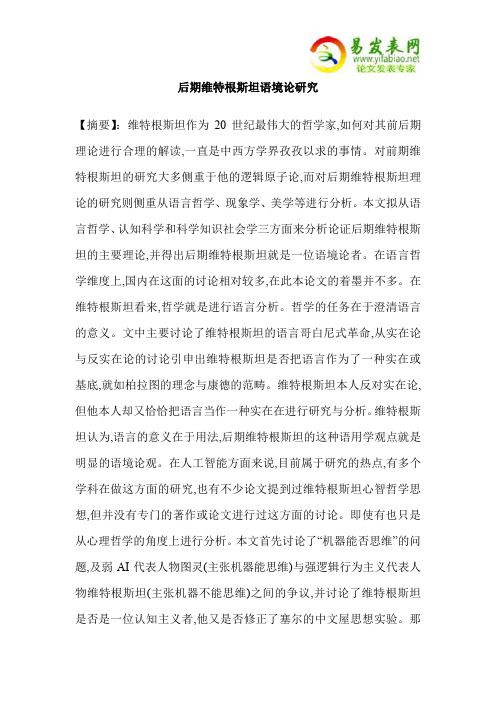
后期维特根斯坦语境论研究【摘要】:维特根斯坦作为20世纪最伟大的哲学家,如何对其前后期理论进行合理的解读,一直是中西方学界孜孜以求的事情。
对前期维特根斯坦的研究大多侧重于他的逻辑原子论,而对后期维特根斯坦理论的研究则侧重从语言哲学、现象学、美学等进行分析。
本文拟从语言哲学、认知科学和科学知识社会学三方面来分析论证后期维特根斯坦的主要理论,并得出后期维特根斯坦就是一位语境论者。
在语言哲学维度上,国内在这面的讨论相对较多,在此本论文的着墨并不多。
在维特根斯坦看来,哲学就是进行语言分析。
哲学的任务在于澄清语言的意义。
文中主要讨论了维特根斯坦的语言哥白尼式革命,从实在论与反实在论的讨论引申出维特根斯坦是否把语言作为了一种实在或基底,就如柏拉图的理念与康德的范畴。
维特根斯坦本人反对实在论,但他本人却又恰恰把语言当作一种实在在进行研究与分析。
维特根斯坦认为,语言的意义在于用法,后期维特根斯坦的这种语用学观点就是明显的语境论观。
在人工智能方面来说,目前属于研究的热点,有多个学科在做这方面的研究,也有不少论文提到过维特根斯坦心智哲学思想,但并没有专门的著作或论文进行过这方面的讨论。
即使有也只是从心理哲学的角度上进行分析。
本文首先讨论了“机器能否思维”的问题,及弱AI代表人物图灵(主张机器能思维)与强逻辑行为主义代表人物维特根斯坦(主张机器不能思维)之间的争议,并讨论了维特根斯坦是否是一位认知主义者,他又是否修正了塞尔的中文屋思想实验。
那么通过分析得出:由于人是特定语境中的人,作为准规则遵守者的机器并不需要环境,由于机器是非语境化的。
因此,语境化是人区别于机器的本质特征之一。
而毋庸置疑维特根斯坦可以算是人工智能的先驱,但把他归于认知主义者,却需要谨慎有待进一步的分析与论证。
并且维特根斯坦是从语义外在论(语境思想)上修正了塞尔的中文屋思想。
在科学知识社会学(SSK)维度上,国内在对SSK对维特根斯坦理论的分析上讨论相对较少。
关于后期维特根斯坦哲学语言观启示论文精选
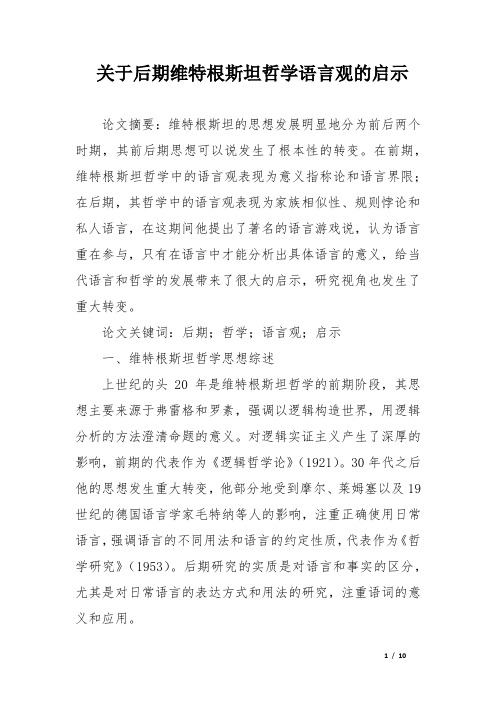
关于后期维特根斯坦哲学语言观的启示论文摘要:维特根斯坦的思想发展明显地分为前后两个时期,其前后期思想可以说发生了根本性的转变。
在前期,维特根斯坦哲学中的语言观表现为意义指称论和语言界限;在后期,其哲学中的语言观表现为家族相似性、规则悖论和私人语言,在这期间他提出了著名的语言游戏说,认为语言重在参与,只有在语言中才能分析出具体语言的意义,给当代语言和哲学的发展带来了很大的启示,研究视角也发生了重大转变。
论文关键词:后期;哲学;语言观;启示一、维特根斯坦哲学思想综述上世纪的头20年是维特根斯坦哲学的前期阶段,其思想主要来源于弗雷格和罗素,强调以逻辑构造世界,用逻辑分析的方法澄清命题的意义。
对逻辑实证主义产生了深厚的影响,前期的代表作为《逻辑哲学论》(1921)。
30年代之后他的思想发生重大转变,他部分地受到摩尔、莱姆塞以及19世纪的德国语言学家毛特纳等人的影响,注重正确使用日常语言,强调语言的不同用法和语言的约定性质,代表作为《哲学研究》(1953)。
后期研究的实质是对语言和事实的区分,尤其是对日常语言的表达方式和用法的研究,注重语词的意义和应用。
维特根斯坦的哲学语言观前后期也发生了很大转变,前期研理想语言,认为语言是现实的逻辑图画,这些观点都严重脱离了生活形式;他在后期转向了研究日常语言,认为语言的意义重在使用之中,尤其是在日常生活的背景之下研究语言的使用,提出了重要的理论——家族相似性。
后期维特根斯坦的语言观表现在三个方面,分别为家族相似性、规则“悖论”和私人语言,他的这些语言观给现代哲学研究和语言研究带来了很大启发。
二、家族相似性的启示维特根斯坦用家族相似性来界定语言游戏间的关系,把语言游戏的关系比作家庭成员的关系,描述了语言之间的相似性,但否认语言本质说。
关于维特根斯坦批判语言具有本质这一点,国内外很多研究维特根斯坦的学者观点不一,但是家族相似性促成了认知语言学范畴化理论的产生,给语言学带来了新的研究视角,这一点儿无人能否定。
维特根斯坦前后期思想
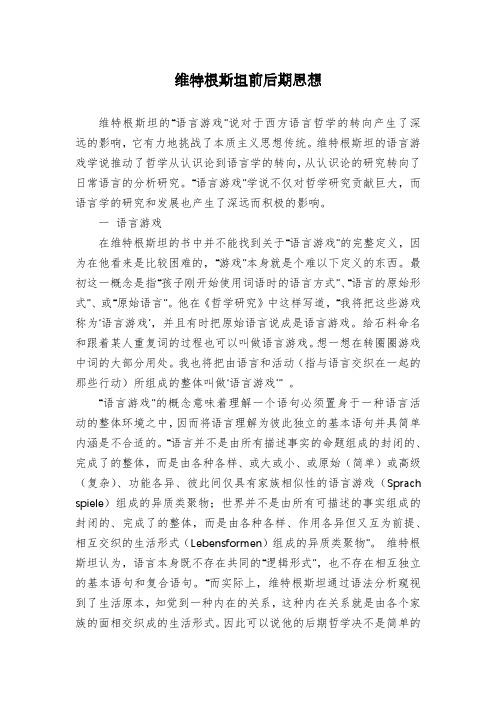
维特根斯坦前后期思想维特根斯坦的“语言游戏”说对于西方语言哲学的转向产生了深远的影响,它有力地挑战了本质主义思想传统。
维特根斯坦的语言游戏学说推动了哲学从认识论到语言学的转向,从认识论的研究转向了日常语言的分析研究。
“语言游戏”学说不仅对哲学研究贡献巨大,而语言学的研究和发展也产生了深远而积极的影响。
一语言游戏在维特根斯坦的书中并不能找到关于“语言游戏”的完整定义,因为在他看来是比较困难的,“游戏”本身就是个难以下定义的东西。
最初这一概念是指“孩子刚开始使用词语时的语言方式”、“语言的原始形式”、或“原始语言”。
他在《哲学研究》中这样写道,“我将把这些游戏称为‘语言游戏’,并且有时把原始语言说成是语言游戏。
给石料命名和跟着某人重复词的过程也可以叫做语言游戏。
想一想在转圈圈游戏中词的大部分用处。
我也将把由语言和活动(指与语言交织在一起的那些行动)所组成的整体叫做‘语言游戏’” 。
“语言游戏”的概念意味着理解一个语句必须置身于一种语言活动的整体环境之中,因而将语言理解为彼此独立的基本语句并具简单内涵是不合适的。
“语言并不是由所有描述事实的命题组成的封闭的、完成了的整体,而是由各种各样、或大或小、或原始(简单)或高级(复杂)、功能各异、彼此间仅具有家族相似性的语言游戏(Sprach spiele)组成的异质类聚物;世界并不是由所有可描述的事实组成的封闭的、完成了的整体,而是由各种各样、作用各异但又互为前提、相互交织的生活形式(Lebensformen)组成的异质类聚物”。
维特根斯坦认为,语言本身既不存在共同的“逻辑形式”,也不存在相互独立的基本语句和复合语句。
“而实际上,维特根斯坦通过语法分析窥视到了生活原本,知觉到一种内在的关系,这种内在关系就是由各个家族的面相交织成的生活形式。
因此可以说他的后期哲学决不是简单的否定了我们对瞬间抓住的事物的对象化和实体化,将哲学简单地归为日常生活哲学”。
因此,在维特根斯坦看来语言不再是简单的符号而已,而是根深于整个意义系统的生活形式之中。
- 1、下载文档前请自行甄别文档内容的完整性,平台不提供额外的编辑、内容补充、找答案等附加服务。
- 2、"仅部分预览"的文档,不可在线预览部分如存在完整性等问题,可反馈申请退款(可完整预览的文档不适用该条件!)。
- 3、如文档侵犯您的权益,请联系客服反馈,我们会尽快为您处理(人工客服工作时间:9:00-18:30)。
“ Tell them I have had a wonderful life.”
1、Transition of the Later Wittgenstein
1.2 Critique of Tractatus
• World and language • Meaning and use
• philosophy
2、Language-games
• “Not: "without language we could not communicate with one another"—but for sure: without language we cannot influence other people in such-and-such ways; cannot build roads and machines,etc. . And also: without the use of speech and writing people could not communicate.” (PI 491)
• Others
2、Language-games
2.1 background theory of language-games 2.1.1 form of life
• “Here the term "language-game" is meant to bring into prominence the fact that the speaking of language is part of an activity, or of a form of life.” (PI 23)
2、Language-games
2.3.2 There are countless kinds of use of what we call “symbols”,”words”,”sentences”.
• “But how many kinds of sentence are there? Say as sertion,question, and command?—There are countless kinds: countless different kinds of use of what we call "symbols", "words", "sentences". And this multiplicity is not something fixed, given once for all; but new types of language, new language-games, as we may say, come into existence, and others become obsolete and get forgotten.” (PI 23)
The Later Wittgenstein
Language-games and Private Language Weither
Framework
What are we going to talk about?
• Transition of the Later Wittgenstein
• Language-games
2、Language-games
2.3 Features
2.3.1 There’s no essence for language-game as human activity
• “'A proposition is a queer thing!' Here we have in germ the subliming of our whole account of logic. The tendency to assume a pure intermediary between the propositional signs and the facts. Or even to try to purify, to sublime, the signs themselves.—For our forms of expression prevent us in all sorts of ways from seeing that nothing out of the ordinary is involved, by sending us in pursuit of chimeras.” (PI 94)
2、Language-games
• In summary Wittgenstein uses the term “language games” to mean:
•
language is made up of various “games” which have their own rules the “speaking” of language is part of an act or part of form of life. To understand the meaning of words one not only needs to know the conventional usage of them but also to pay attention to their pragmatic use.
Language-games theory is based on “form of life”.
2、Language-games
2.1.2 meaning and use
•
“For a large class of cases—though not for all—in which we employ the word "meaning" it can be defined thus: the meaning of a word is its use in the language.” (PI 43)
“Meaning is use” gives way to an emphasis on the diversity of uses.
2、Language-games
2.2 what language-game is?
• “In the practice of the use of language (2) one party calls out the words, the other acts on them. In instruction in the language the following process will occur: the learner names the objects; that is,he utters the word when the teacher points to the stone.—And there will be this still simpler exercise: the pupil repeats the words after the teacher——both of these being processes resembling language.” • “And the processes of naming the stones and of repeating words after someone might also be called language-games. Think of much of the use of words in games like ring-a-ring-a-roses.” • “I shall also call the whole, consisting of language and the actions into which it is woven, the "language-game".” (PI 7)
2、Language-games
• “Review the multiplicity of language-games in the following examples, and in others:
• • • • • • • • • • • • • • Giving orders, and obeying them— Describing the appearance of an object, or giving its measurementsConstructing an object from a description (a drawing)— Reporting an event— Speculating about an event— Forming and testing a hypothesis— Presenting the results of an experiment in tables and diagrams— Making up a story; and reading it— Play-acting— Singing catches— Guessing riddles— Making a joke; telling it— Solving a problem in practical arithmetic— Translating from one language into another— Asking, thanking, cursing, greeting, praying.” (PI 23)
1、Transition of the Later Wittgenstein
1.3 Similarities
• He is focus on how to express thoughts
• Philosophy is understood as a kind of activity • Way to deal with Philosophical problems
